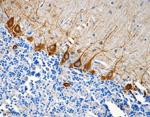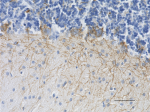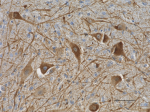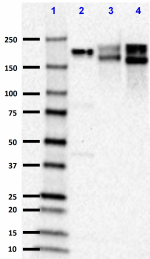- Clone
- SMI 38 (See other available formats)
- Regulatory Status
- RUO
- Other Names
- Neurofilament heavy polypeptide, NF-H, 200 kD neurofilament protein, neurofilament triplet H protein
- Isotype
- Mouse IgG1, κ
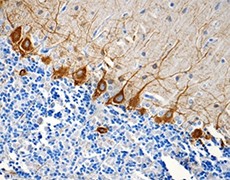
-

IHC staining of purified anti-Neurofilament H (NF-H) antibody (clone SMI 38) on formalin-fixed paraffin-embedded rat brain tissue. Following antigen retrieval using Retrieve-All Antigen Unmasking System 3: Acidic, 100X (Cat. No. 927601), the tissue was incubated with 5 µg/ml of the primary antibody overnight at 4°C. BioLegend's Ultra-Streptavidin (USA) HRP kit (Multi-Species, DAB, Cat. No. 929901) was used for detection followed by hematoxylin counterstaining, according to the protocol provided. The image was captured with a 40X objective. -

IHC staining of purified anti-Neurofilament H (NF-H) antibody (clone SMI 38) on formalin-fixed paraffin-embedded rat brain tissue. Following antigen retrieval using Retrieve-All Antigen Unmasking System 3: Acidic, 100X (Cat. No. 927601), the tissue was incubated with 5 µg/ml of the primary antibody overnight at 4°C. BioLegend's Ultra-Streptavidin (USA) HRP kit (Multi-Species, DAB, Cat. No. 929901) was used for detection followed by hematoxylin counterstaining, according to the protocol provided. The image was captured with a 40X objective. Scale bar: 50 µm -

IHC staining of purified anti-Neurofilament H (NF-H) antibody (clone SMI 38) on formalin-fixed paraffin-embedded rat brain tissue. Following antigen retrieval using Retrieve-All Antigen Unmasking System 3: Acidic, 100X (Cat. No. 927601), the tissue was incubated with 5 µg/ml of the primary antibody overnight at 4°C. BioLegend's Ultra-Streptavidin (USA) HRP kit (Multi-Species, DAB, Cat. No. 929901) was used for detection followed by hematoxylin counterstaining, according to the protocol provided. The image was captured with a 40X objective. Scale bar: 50 µm -

Western blot of purified anti-Neurofilament H (NF-H) antibody (clone SMI 38). Lane 1: Molecular weight marker; Lane 2: 20 µg of human brain lysate; Lane 3: 30 µg of mouse brain lysate; Lane 4: 10 µg of rat brain lysate. The blot was incubated with 1 µg/mL of the primary antibody overnight at 4°C, followed by incubation with HRP labeled goat anti-mouse IgG (Cat. No. 405306). Enhanced chemiluminescence was used as the detection system.
| Cat # | Size | Price | Quantity Check Availability | ||
|---|---|---|---|---|---|
| 835903 | 25 µg | $112.00 | |||
| 835904 | 100 µg | $276.00 | |||
Neurofilaments (NFs) are ~10 nanometer, type IV intermediate filaments expressed in neurons. NFs are the major components of the neuronal cytoskeleton, and primarily function to provide structural support for axons and regulate axonal diameter. There are three major mammalian neurofilament subunits, which are named based on their apparent molecular weight: 1) neurofilament light (NF-L, ~70 kD), 2) neurofilament medium (NF-M, ~145-160 kD), and 3) neurofilament heavy (NF-H, ~200-220 kD). Neurofilaments are extensively phosphorylated, and their phosphorylation status plays an important role in modulation of their function. Abnormal NF modifications, mutations, and accumulation have been associated with neurodegenerative diseases. NF immunostaining is commonly used as a diagnostic marker for neuropathology detection. NFs are also useful for differentiating neurons (positive for NF) from glia (negative for NF).
Product Details
- Verified Reactivity
- Human, Mouse, Rat
- Antibody Type
- Monoclonal
- Host Species
- Mouse
- Formulation
- Phosphate-buffered solution, pH 7.2, containing 0.09% sodium azide.
- Preparation
- The antibody was purified by affinity chromatography.
- Concentration
- 0.5 mg/ml
- Storage & Handling
- The antibody solution should be stored undiluted between 2°C and 8°C.
- Application
-
IHC-P - Quality tested
WB - Verified - Recommended Usage
-
Each lot of this antibody is quality control tested by formalin-fixed paraffin-embedded immunohistochemical staining. For immunohistochemistry, a concentration range of 5.0 - 10 µg/ml is suggested. For Western blotting, the suggested use of this reagent is 1.0 - 10 µg/ml. It is recommended that the reagent be titrated for optimal performance for each application.
- Application Notes
-
SMI 38 reacts with a non-phosphorylated epitope in neurofilament H (NF-H) of most mammalian species. SMI 38 visualizes neuronal cell bodies, dendrites and some thick axons in the central and peripheral nervous systems. Other cells and tissues are unreactive.
-
Application References
(PubMed link indicates BioLegend citation) - RRID
-
AB_2715863 (BioLegend Cat. No. 835903)
AB_2715863 (BioLegend Cat. No. 835904)
Antigen Details
- Structure
- Neurofilament H has an apparent molecular mass of 200-220 kD.
- Distribution
-
Tissue distribution: CNS, peripheral nerves and glandular cells of prostate.
Cellular distribution: cytoskeleton, nucleus, cytosol, and mitochondrion. - Function
- Neurofilaments are the major components of the neuronal cytoskeleton. They provide axonal support and regulate axon diameter.
- Cell Type
- Mature Neurons
- Biology Area
- Cell Biology, Cell Motility/Cytoskeleton/Structure, Neuroscience, Neuroscience Cell Markers
- Molecular Family
- Intermediate Filaments
- Gene ID
- 4744 View all products for this Gene ID
- UniProt
- View information about Neurofilament H on UniProt.org
Other Formats
View All Neurofilament H (NF-H) Reagents Request Custom Conjugation| Description | Clone | Applications |
|---|---|---|
| Purified anti-Neurofilament H (NF-H) | SMI 38 | IHC-P,WB |
Compare Data Across All Formats
This data display is provided for general comparisons between formats.
Your actual data may vary due to variations in samples, target cells, instruments and their settings, staining conditions, and other factors.
If you need assistance with selecting the best format contact our expert technical support team.

